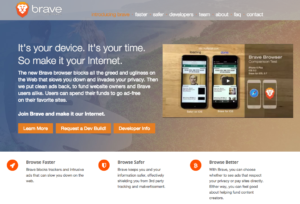The new Brave browser. And why it's not going to work.
When Brendan Eich, the co-founder of Mozilla and inventor of JavaScript announced last week that he was not only producing a new web-browser, but that his new browser would address the issue of adblocking, the Internet stood up and took notice.
Eich’s new browser, “Brave” is based on a simple premise: Faster, more respectful advertising, less tracking and greater privacy. The Brave browser swaps out “bad ads” for “lite ads” which contain no malware and don’t track users. What’s not to like? Users who object to even these “lite” advertisements and want a completely ad-free browsing experience will be given the option of supporting their favorite sites via BitCoin payments which are shared between Brave and the website’s publisher.

So with no-tracking, no malware, and “lite” ads (or no ads at all in exchange for BitCoin) have we arrived at a utopian web where users and publishers live in mutually beneficial harmony?
Of course not.
Brave won’t work because it fails to address the fundamental “problem” of AdBlocking.
If users were presented with just two options, a slow, bloated web filled with intrusive ads which violated user-privacy, on one hand. And on the other hand, a web with fast-downloading “lite” ads which contained no tracking whatsoever — the choice would be simple. The latter choice would be an obvious win.
But what Eich and so many other entrepreneurs in the adblocking space seem to ignore is that there is already a far better option from the consumer perspective: No ads at all.
A totally free web with zero ads, is always going to be faster and cheaper than anything Brave can offer. So why would any consumer choose Brave’s apparently sub-optimal solution?
Eich’s answer: Sustainability.
Eich commendably seeks the holy grail of a sustainable web. A web in which publishers can continue to produce endless content, and users can avail themselves of it — for free. Clearly, the ad-blocked web is not that. As Eich notes on Brave’s website, “With enough people blocking ads, the Web’s main funding model is in jeopardy.” And with ad-blocking rates in excess of 50% for some websites, the future is looking increasingly bleak for many publishers.
As much as I wish he were on to something, where Eich gets it wrong is his assumption that enough of the Web cares.
Ad-blocking as an “environmental” problem
A good analogy to the problem of ad-blocking is environmental conservation: We all know from reams of experience that if consumers are offered a cheaper, yet environmentally irresponsible option vs. a more expensive, yet environmentally conscious option: The vast majority of consumers will sadly choose the cheaper option. Better-for-me unfortunately trumps better-for-everyone just about every time. Legislation and massive campaigns for social consciousness have helped to tip that balance in environmental terms, but few such forces exist online for the benefit of the web eco-system.

The notion of a business model which asks users to accept a perceived sub-optimal browsing solution vs. the perceived optimal experience of ‘no advertising’, simply on the basis creating a sustainable, publisher-conscious web eco-system is a noble yet hopelessly idealistic pipe-dream.
Today’s Internet denizens remain blissfully unaware that their endless oceans of free web-content are threatened. Many have grown up in a world where content is just free. So divorced is the perception of advertising from the public’s understanding of journalism’s business model, that many millennials see advertising is an illicit attempt to monetize that which would otherwise just exist for free.
As with every other facet of consumerism, the majority cares little about sustainability as long as they’re getting what they want, now.
So what would make Brave not fail?
Less idealism.
Blocking Adblock certainly helps. Putting a firm barrier in place against the option of a 100% ad-free, ad-blocked web is the first step. But simply asking users to put their social-consciousness before their personal-benefit is unfortunately not likely to be a solution that re-captures any significant percentage traffic lost to ad-blocking.
The solution to the problem of ad-blocking is not just asking everyone to “understand”.

It’s just another company trying to extract money from publishers like Adblock+. They’re all the same. They pretend to be pro-consumer, but they’re taking a huge chunk of the profits for themselves. Websites end up with a fraction of the revenue, and no analytics. How’s that better than Adblock+ again?
Google can shutdown Adblock if they wanted too. They could remove their apps off of their Google Play store and not allow certain browsers on their new devices and also go all out Hulu on them lmao and block them out on YouTube.
They do not want the backlash, but users will not leave YouTube and YouTube is not a huge moneymaker for Google. ( they say )…
YouTubers should not use long video ads before their videos and opt out… this is what people hate the most.
I’m pretty sure when people use Adblock they want no ads, not different ads.
I prefer different, but then again I am different … would much rather see ads based on the website content and ads with no malware- not to mention websites loaded with so many ads my page doesn’t load.
If I am looking for a new smart tv and go to a website that does a great job in reviews and they have ads on that product, then i am in the right place.
It’s a thank you in a way for that person giving a better review than the manufactorers lol
I actually agree with the first comment on here. I didn’t start using an ad blocker until ads became so intrusive and annoying, and this may be the majority of ad blocker users. There really aren’t many options for a middle ground. I feel that this browser could be the begining of a new thing when it comes to content consumption.
I like the idea. People always forget that content can not stay around without paid servers. Well, if you are hosting your projects at home over your own computer, that could be different, but even then you have to pay electricity and so on.
What Brave should do is change the concept in that way that it is up to the user to decide if he wants to support certain websites with replacement ads and that the user also has the chance to block all ads.
In the end it is choice which draws people to projects, not missing of choice.
It’s funny, because ad-block got popular because of the spreading of ads which would play sounds, spam pop-ups and be very intrusive, actually ruining user experience… But hey, I didn’t see any site actually caring for such complaints and disabling them. One side is about arrogating the right of filling their own sites with any kind of ads, the other is about being fed up of all that and just shutting down all ads, and none of them actually cares for any real global repercussion, except for personal gain. Brave is trying to find a common ground, where ads aren’t harming the user experience (thus not making users feeling compelled to disable them) and no revenue for sites will be lost. Yet, from what I read in this article, it’s not about that at all. It’s about having the power to impose whatever a site wants to its users, no matter if it may be bad for them. The power to put any kinds of ads, without a way to disable them, without a limit to how they can or can not behave. So, selfishness of the users vs selfishness of the sites… It’ll just keep going on and on. There’s already a way to hide ad-blockers from sites, and soon there’ll be a work around for it, and so forth… If you can’t understand that, and if you like to believe that users wouldn’t care if you offered light ads because they completely lack conscience, then how can you blame them for thinking the same of you? But, yeah, I get your point. Starting a new ads-war will end up giving more revenues to both ad-blockers and anti-adblockers, so… Whatever, you still can’t do anything against text browser, or to force users to keep javascript enable… Brave will hopefully take all of you by surprise ^^
I agree wholeheartedly. Also, I think the great promise of Brave is not necessarily the success of that browser alone, but the pioneering of a new wave of common APIs to enable micro-payments to publishers. Once brave can validate the concept (they’re doing the legwork of getting publishers setup to receive said payments), I believe the model will make the jump to other browsers via plugins.
Thank you dear friend.
You explained very good.
For ex. I go to sites that use adfly or ….
I don’t have problem with that.
I can spend 5 second for a good thing because that website also should pay their servers.
But i hate adfly, i like other similar sites for ex. Sh.st is great.
If you don’t have ad blocker, you never can get the link.
The 5 second never will end.
Every time you press the button after 5 second you will get several pop ups.
Also that is not the problem.
The problem is also the main adfly page will redirect to a trash site and you didn’t get your link.
I hope brave model be successful.
However i don’t know if it also have profits for low traffic websites or not.
I actually think that AdBlock+ recognizes that this is a problem, and by default, doesn’t block un-intrusive ads. The only problem is that users can turn off this option. AB+ can’t force users to have this option on because if they did, other rip-off companies will just create one that does. What would be ideal is if BA added an option where the pop-up only displays if the user is blocking the un-intrusive ads.
Except for the simple fact that Brave is faster than a normal browser with an ad block extension. I used a local dns server blacklisting ad servers long before ad blockers were popular, and in my tests Chrome was still slightly faster than Brave with that local DNS, and much faster than Chrome with AB+. Doing the same even with a hosts file might not be practical for most non-technical users, so Brave does have its appeal.
Having downloaded Brave and used it, I find it MORE annoying that I have to click 10 tabs closed than worry about an “in place” add that doesn’t open more tabs.
brave gives option for brave ads (good ads) and option to block all ads like ad blocker extensions on chrome or other browser give, so for brave its a win win situatuion
I wanted to like brave, but it’s an even bigger resource hog than Chrome and Edge. I can’t run ANYTHING else while running this browser; it eats too much computing time.
Sadly, Opera has been trending toward the crome/edge/firefox side, which makes it ever less compelling, since those are all scraping the bottom of the barrel in terms of quality; web browsers have redefined the low bar for software quality.
I think the best solution would be something like Netflix does with movies.
You pay so-and-so much per month to Company ABC, for a collection of web sites, or sets of them. Maybe with packages, like cable does, with security implemented by ABC. Or a la carte, and with click-through allowed.
Of course I think this is sort of what Brendan Eich has in mind.
But so many people expect , and companies want to pay to advertise, so Eich’s plan has good merit.